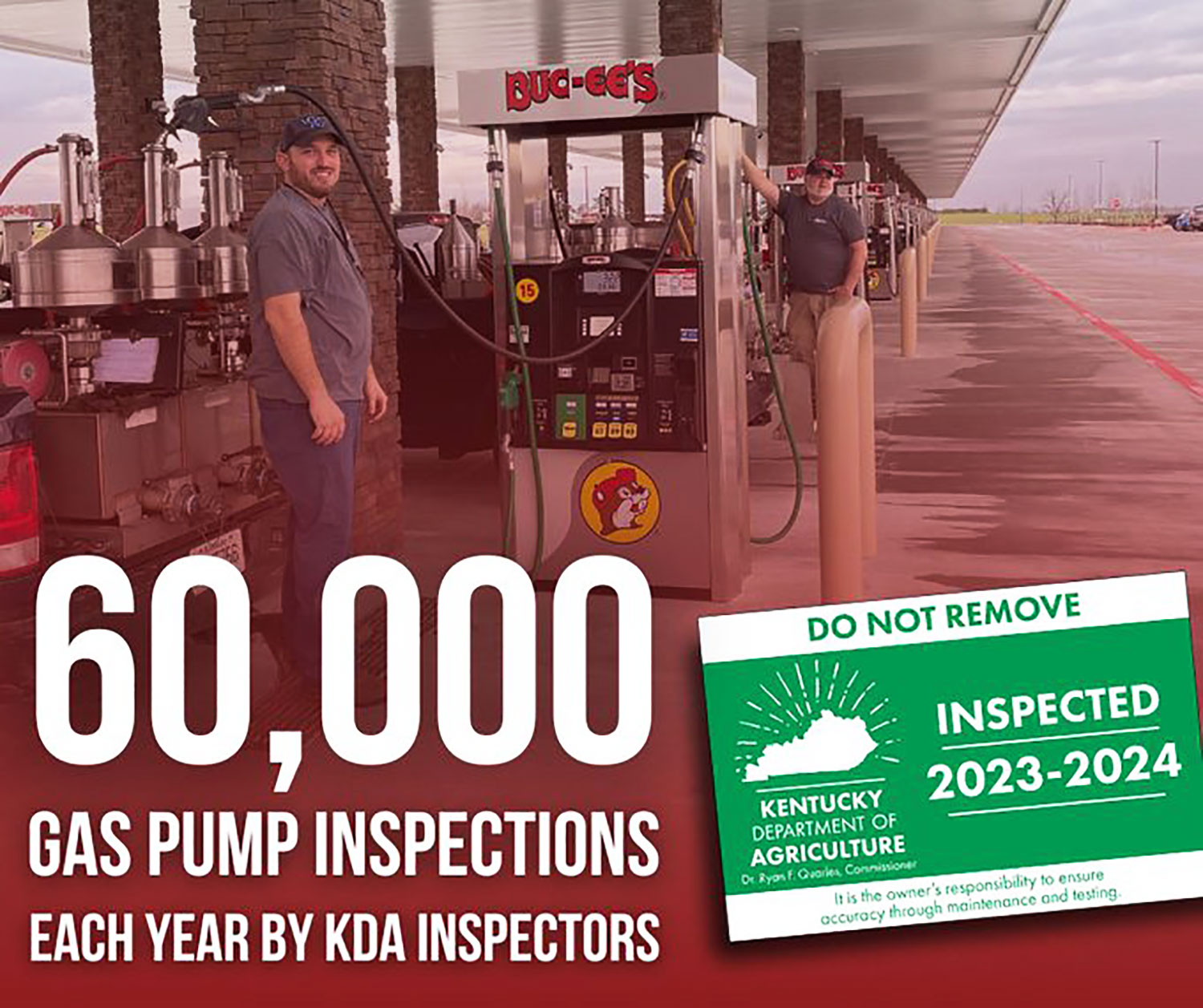JULY
Did you know KDA inspects gas pumps, scanners, scales?
By Chris Aldridge
Kentucky Ag News
When consumers pull up to a gas pump and see a current Kentucky Department of Agriculture (KDA) inspection sticker, they can rest assured that pump has been tested inside and out.
Nineteen KDA motor fuel inspectors are on the job this summer, making sure consumers get what they pay for when it concerns the correct quantity and quality of fuel. Fuel pumps are also examined to make sure they are free of “skimmers” that thieves use to steal consumers’ credit card information.

“We inspect about 60-some thousand gas pumps a year,” said Jason Glass, director of the KDA’s Division of Regulation and Inspection. “Right now (through June 26), we’ve done over 21,000 gas pumps.”
The pump equipment is inspected for leaks inside and out. Then the inspector fills a marked container, called a prover, to check that the meter is working properly, and the price is computed correctly. (Click on this video to see a typical equipment inspection.)
“While we do that, we’ll look for skimmers,” Glass said. “When we got the pump doors open to make sure the seals are there, a lot of times we’ll look for the skimmer there. If not, we’ll open up the top panel and look.”
Glass said KDA inspectors have not found many skimmers this year. But he said thieves are still active and have moved on to other tactics, which he didn’t want to disclose.
Gas pumps in Kentucky are also inspected for quality. Fuel samples are shipped to a lab in Houston for testing, with results received within 72 hours. (Click on this video to see a typical quality inspection.)
“We’re trying to be responsive in a timely manner to make sure if there is bad fuel, we get it shut down,” Glass said. “If we find bad gasoline, our inspectors deliver those shutdown notices, tag those pumps out of service, and tie them down so a consumer can’t inadvertently use them.”
If a yellow “out of service” sack is covering the pump handle, that’s usually put there by the gas station. KDA ties down the handle with a zip tie and red tag.
“That’s if it’s bad fuel or the device is so out of specification that it would harm a consumer,” Glass said. “We try to zip tie it down so you can’t pull it (pump handle) out and use it inadvertently.
“It it’s just one grade (that’s bad) on a multi-grade nozzle, we put a tag over the top of that grade. We cover the button so you can’t use it.
“We do everything we can to notify the consumer,” he added. “Then they (the station personnel) are required to notify us when it’s fixed. We retest it (fuel) to make sure it’s up to spec before we allow it to be sold again.”
The most common problem with fuel is cross dumping, when diesel fuel is accidentally added to underground gasoline tanks, or vice versa.
“They (gas stations) typically catch that before the (tanker truck) driver ever leaves and shut that down so the public doesn’t buy it,” Glass said. “If we’re made aware of that (cross dumping), it’s usually a one or two vehicle thing before they got it shut down. A lot of times, stations will take responsibility for those, and we don’t have to become involved because we don’t have authority to mitigate a consumer’s recourse against a business.”
The inspectors’ supervisors usually perform the inspections when there is a complaint or request.
“Typically, we’re on those within 24 hours if somebody feels like they have a problem,” Glass said. “If it’s something off the wall … they (supervisors) are a little more freed up to be able to run from county to county.”
When the weather turns colder in early November, KDA inspectors move indoors to inspect scales and scanners at retail stores, such as Kroger and Walmart. This year, through June 26, KDA inspectors have examined 10,000 scales; scanned more than 39,000 items looking for incorrect pricing; and verified that 668 packages, such as meat, are labeled with the correct weight.
“Scales, price verification, and net content verification – we do all three of those in unison,” Glass said. “We’re constantly in and out of retailers year-round.”
Consumers who believe they were charged an incorrect price by a gas station or retail store, or purchased poor quality fuel can lodge a complaint to KDA here. All complaints are taken seriously and investigated.

